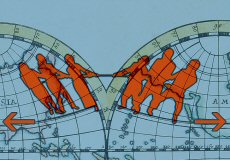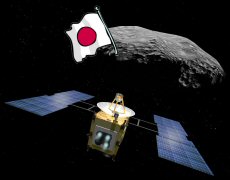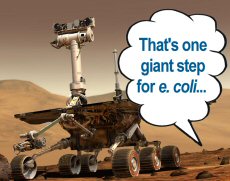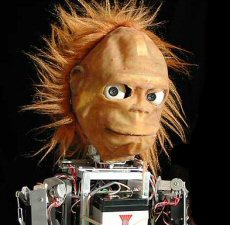Feature Articles (2005)
(Back to the Current Features Page)
23 December 2005
Gravity Grind - A Day In The Life Of A Gravity Detective
In a remote forest outside the world's most isolated city, engineer Chunnong Zhao begins his day's work at the Australian International Gravitational Observatory, one of four such observatories spread around the Earth that are searching for Albert Einstein's elusive gravity waves...
16 December 2005
The Origin of the Solar System: Buffy Slays a Theory
It's possible that recent observations of a new celestial object - named Buffy - could trigger a major reassessment of our current theories about the Solar System's evolution. Buffy appears to be about half the size of chilly Pluto and is located double the distance of Neptune from the sun. But Buffy just doesn't fit into current models of the Solar System; she's a loner, an outsider performing her own cosmic ballet...
9 December 2005
Do We Need A New Kind of Science?
Wolfram's idea is that one simple programming model - rather than a complicated and inefficient mathematical language - will best describe the Universe in which we reside. But scientists are not about to abandon their methodological rules for exploring the Universe so easily. Many say that there is nothing new about Wolfram's science at all, claiming that a number of great minds had already visited the problem by the time he had begun his own explorations; and what's worse, he didn't even acknowledge their efforts…
2 December 2005
In Space, No One Can Hear You Say "Doh!"
Space exploration is an unpredictable business - no matter how well you plan ahead. Some mistakes cost lives, others cost money, and for some, well, we've yet to know the price we'll have to pay. But hey, it's not a mistake, it's a learning experience!
25 November 2005
Mathematics In Crisis - Where To Now?
There is a profound and irreversible change happening in mathematics, which will affect decisively its character. Mathematics will soon be seen as something created by finite human beings, liable to error in the same way as all the other activities we partake in. And mathematicians - like engineers - will have to declare their degree of confidence that certain results are reliable, rather than being able to declare flatly that their mathematical proofs are correct…
18 November 2005

The War On Science
Stem cells, passive smoking, mercury poisoning, evolutionary theory, abortion, wildlife conservation and global warming are just some of the areas where the Republican Party is not merely ignoring scientific advice, but is actively engaged in using industry funded research to distort and misrepresent scientific consensus. Under previous administrations, you may have been correct if you assumed that science policy was informed by scientific research. Make that same assumption today, however, and you'd probably be wrong...
11 November 2005
Face Transplants - Here's Looking At You
It seems that reality is about to imitate film fantasy, as a group of surgeons ready themselves to make history with the world's first face transplantation. In doing so they'll test the boundaries of medicine and bioethics, and there is also the small matter of finding a willing participant to join them on their pioneering quest...
4 November 2005

Japan's Space Program Comes of Age
Largely out of the media spotlight, Japan has forged ahead in the space race and asserted its celestial competency by conducting a number of ambitious missions. The most significant of these explorations currently underway is the unmanned Hayabusa mission, which involves landing a spacecraft on an asteroid, collecting a sample of the asteroid and returning the sample to Earth for analysis...
28 October 2005

The Hitchhiker's Guide To Mars Rovers
It seems that instead of searching for life on the red planet, NASA may have already planted it there. Earlier this year, NASA engineers at the agency's spacecraft assembly plant in Pasadena, California, confirmed that microbial Earthlings had hitched a ride to Mars inside the rovers' electronic circuitry...
28 October 2005
Death Rays And Tennis Balls
"National security" and "state secrets" could be the new bogeymen for inventors who may find their inventions summarily taken from them, with no recourse for action…
21 October 2005
Delusions And Mental Illness
What does the concept of belief really mean? Does a delusion have to be false? Psychologists and neuroscientists are teaming up with philosophers to answer these questions and better understand human delusions and the belief systems we build around them...
14 October 2005

Artificial Intelligence In The Garden Shed
Chess programs, digital dogs and robot vacuum cleaners are all well and good but they do not represent self-generated thought, as they can only perform the tasks that their programmers have fed them. To create true artificial intelligence we almost certainly need to first understand human consciousness. And the best way to do that, according to one maverick scientist, is to build your own android...
7 October 2005
Chernobyl: No People But A Thriving Ecosystem
After the meltdown, the prognosis for Chernobyl and its environs - succinctly dubbed by the Soviets as the Zone of Alienation - was grim. But surprisingly, Chernobyl's surrounding flora and fauna have flourished remarkably. Author Mary Mycio vividly describes an extraordinary - and at times unearthly - new ecosystem that is flourishing in this no-man's land, where radiation levels are too intense for people to live...
30 September 2005
Solar Car Challenge: Three Wins In A Row for Dutch
According to organizers, the World Solar Car Challenge is supposed to be fuelled by the spirit of friendly competition, but it's hard to shake the feeling that the competitors are just as hot-blooded as their fuel-injected Formula One counterparts. As the race played out, the Dutch team's streamlined solar car, Nuna 3, led the way from start to finish, while breaking their previous world record time to boot...
23 September 2005

Missing Link A Tripping Chimp?
New research into prehistoric dietary habits suggests that the humans who split from their chimp cousins seven million years ago may have subsisted on roots and tubers that they foraged from under the savannah. Interestingly, one particular root contains psychoactive compounds that can cause effects similar to the drug LSD. Could it be that human intelligence was jump-started in chimps thanks to a mind-expanding trip?
16 September 2005
Savoring The Flavoring
Are wine-buffs coaxed into buying their particular brand of poison just because that's what current trends dictate? Is an appreciation of haute cuisine no more than a learned social behavior? These are just two of the conclusions you could draw from recent research into taste perception. According to the researchers, one person's taste is unique from the next, with taste and odor perception being dramatically more complicated than our other sense perceptions. To understand why this is so, scientists have had to study taste at the genetic level…
9 September 2005
Stem Cell Stumbling Blocks
Despite the negativity and suspicion that stem cell research has attracted in the mainstream media, it has made remarkable headway in a relatively short period. But there are still major problems for scientists in their pursuit of new treatments and cures for a range of ailments. The obstacles to overcome are not trivial. Two of the most pressing problems are stem cell over-proliferation and stem cell navigation...
2 September 2005

Can The 10,000-Year Clock Save Humanity?
Religious differences, resource plundering and war can bring an end to even the most advanced civilizations. And while it might seem that we're headed down the same path, an organization called the Long Now Foundation wants us to start taking a more long-term view of our planet, so that we become responsible custodians for the world our children and grandchildren will inherit. How long-term? How about 10,000 years...
26 August 2005
The Race To Understand Skin Cancer
The incidence of skin cancer among young adults has been steadily increasing over the past thirty years, but for researchers, the relationship between UV's effects on DNA and the formation of skin cancers remains elusive. But fundamental research into how ultraviolet radiation affects our DNA may at last help us to understand how skin cancers form...
19 August 2005
Intelligent Design Down Under
It's not hard to see how Intelligent Design could gain a strong foothold in the United States. After all, America's puritanical roots and the robustness of its bible belt, coupled with a clueless administration, should ensure that Intelligent Design will co-habit with evolutionary theory throughout the nation's schools. But Intelligent Design has opened up a new front south of the border - Australia. And our convict descended buddies were a tad shocked when Brendan Nelson, the Australian Federal Education Minister, said that Intelligent Design should be taught alongside the theory of evolution in Australian schools...
12 August 2005
Food, Notorious Food
Our ancestors had it pretty tough when it came to feeding the family. Leaving the cave to spear something for dinner was fraught with danger and disappointment. We may have it easier nowadays, but have we swapped nutritional content for convenience? Evidence is mounting that the foods we eat are becoming less and less nutritious thanks to factors that seem beyond our control...
5 August 2005
Is Subconscious Perception the Root of All Evil?
Not all of the brain's data acquisition occurs consciously. Research has shown that much of the visual data that we are exposed to slips past us without being consciously registered, but still manages to continue on to the brain's processing network. In light of this, does it follow that the incessant unchecked stream of data entering our brain's neural pathways can have the effect of significantly influencing our behavior? Do television, cinema and video games actually have a subliminal effect on viewers?
28 July 2005
Autism, Asperger's and Evolution
What is the difference between a genetic abnormality and genetic evolution? Is the human body's adaptability responsible for many of the conditions that we call mental disorders? Researchers concede that the science world is still in the dark about the causes of autism and asperger's disorder, but do believe that autism and asperger's are most likely genetically oriented. Is it possible that in disorders such as autism and Asperger's we are witnessing evolution at work?
21 July 2005

Too Much Uncertainty For Quantum Computers
Welcome to Quantum Computing 101, or is that Quantum Computing 010 or 000? Dutch theoretical physicists have cast fresh doubt on whether quantum computers will be able to sustain quantum bit coherence for the length of time required to complete a computation. But if quantum mechanics can kiss and make-up with classical physics, then Schroedinger's kittens just might come to the rescue...
15 July 2005
Do We Really Understand Gene Transfer?
The 'tree of life' visualization used to illustrate gene transfer between organisms has been a mainstay of scientific orthodoxy for years, but new research has turned that dogma on its head by observing that gene transfers occur not only vertically, from one organism to its progeny, but also horizontally through the exchange of genetic material between distantly related organisms...
8 July 2005
A Penny for Your Qualia
The word qualia accounts for the subjective sensation experienced by a person when they see a color or eat an ice cream. But are qualia quantifiable brain states or are they merely a matter of semantics? As an area of research, the study of qualia has predominantly been relegated to the domain of philosophy, but philosophers had better make up their minds fast, because current research on subjective cognition in the field of neuroscience seems determined to drag the concept of qualia out from the shadows of philosophy into the harsh light of physical science...
30 June 2005
Deep Impact Could Validate Panspermia
The Deep Impact mission may change the way scientists look at not only comets, but at how life could be dispersed across the universe. The concept of panspermia, that comets may be carriers of organic matter and the seeds of life, could be supported by the findings from the Deep Impact mission...
29 June 2005
Brain Thrives On Constant, Chaotic Communication
The brain is like a Swiss Army knife, made up of a whole bunch of sub-modules that continuously chatter away to each other in a chaotic fashion...
24 June 2005
"Holy Grail" Still Elusive
A peculiar force that works at the quantum level has been the subject of some intense examination, and it looks as though the findings could help nanotechnologists solve some troubling problems with future nanotechnology...
16 June 2005
Does Time Exist?
While time may be a convenient metronome that delivers neatly portioned slivers of existence to conscious beings, the idea of a 'universal time' is looking increasingly fanciful, at least to some physicists...
9 June 2005
It Came From Outer Space
It's possible that bacteria traveling through space on comets were the building blocks for all life on Earth. The idea is called Panspermia and is backed by a number of high-profile scientists. Like dark matter and dark energy, it's difficult to prove one way or the other, but hotly contested evidence concerning whether there was, or is, life on Mars may provide evidence of life-creating space invaders...
3 June 2005
Apocalypse NEO!
Given the unpredictable environmental factors - such as the Pioneer anomaly - and the physical vagaries of deep space, how much faith should we place in the predicted "safe" trajectories of NEOs like asteroid 2004 MN4?...
24 May 2005
A Spoonful Of Science Helps The Climate Change Go Down
The general public is getting muddled messages on climate change from the media and scientists and politicians aren't helping...
